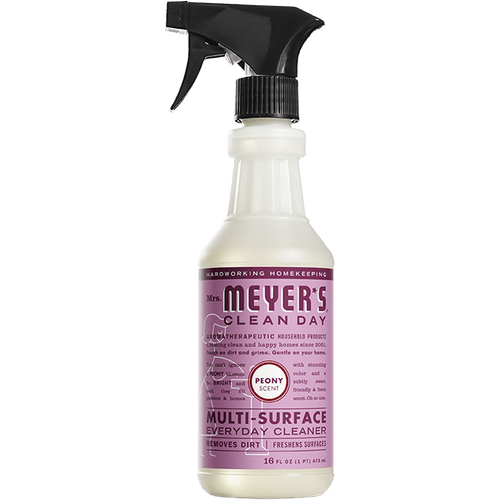Eco-friendly products for your Spring cleaning session
4 min read
Mrs. Meyer's is a recommended cheap, eco-friendly cleaning alternative. | Mrs. Meyer's Clean Day
ALYSSA SPENCER
Staff Writer
Spring cleaning is an activity enjoyed by some and necessary for all. With the warmer weather coming in hot, the desire for many to begin opening up their windows and letting in some much-needed fresh air and sunlight has arrived. With nature’s renewed vibrance and delicate scents, it’s important to refresh and reclean to not let one’s living space remain stale after a long winter indoors.
Being a busy college student living in small dorms or apartments often leads to an agglomeration of clothes, shoes and old toothpaste residue on bathroom sinks. And with finals and move-out dates right around the corner, cleaning your space now could go a long way in preparing you for the upcoming chaos. Whether this means just giving your space a quick tidy up, or a full-on wash, it is encouraged that you attempt to do so with the environment in mind to minimise your overall impact.
There are numerous eco-friendly cleaning products that are available both on Amazon and at your local grocery store, and sometimes it can be difficult to choose which products are actually good for the environment and not just a greenwashing scam. In addition, many people are misled into believing that green products are more expensive, which can discourage college students from using the products at all. This is simply not true.
One cleaning activity that we all do no matter what time of year it may be is laundry day. The Tide pods that are a staple for most college students, and the wasteful drying sheets common to most households, are not only bad for the planet but are also a very costly expense. That is why switching to detergent sheets and dryer balls are one of the best clean switches one can make! Tide pods are typically bought in massive plastic containers and are filled with unnecessarily harsh chemicals. These pods typically sell for around $20 on Amazon. The Sheets Laundry Club Laundry Detergent is typically $17 for a semester’s worth of eco-friendly detergent. Not only are these cheaper than the pods, but they are delivered in a cardboard box that can be completely recycled, and the detergent is in the form of sheets which can dissolve immediately when wet, a huge advantage compared to the plastic tide pod.
As for the second half of the laundry process, dryer balls, which are often made with sheep wool, can be purchased for as cheap as $6.99 on Amazon. However, on average they sell for $10 and can be found in most grocery stores. These little wool balls are amazing with static control and can last for years with no maintenance or effort. Most are even compostable at the end of their life. You can even add essential oils to the balls before loading the dryer and your clothes will come out smelling as fresh as a spring daisy!
As for every day cleaning products like multipurpose cleaner for desks and countertops, the Mrs. Meyer’s brand is known for its clean and green reputation. You can purchase a single 12 oz. bottle of Mrs. Meyer’s Multisurface Everyday Cleaner for as little as $3.88. This bottle gives you the option to further create less waste by using a reusable hand towel with it instead of disposable paper towels. Mrs. Meyer’s main competitor seems to be Clorox Disinfectant Wipes, because they tend to be convenient and usually cheap, however the prices for these wipes vary depending on where you purchase them. They are commonly sold anywhere between $2-$20, and are not only wasteful in nature, but they are filled with harsh chemicals that have the potential to be problematic for one’s health.
The products mentioned above are just a few out of many. If you are curious about the products you use and how they may compare to other brands, check out EWG’s Guide to Healthy Cleaning. EWG, also known as the Environmental Working Group, is a nonprofit that has created an informative database of everyday cleaning products, where you can compare the overall health and safety of a multitude of cleaning products. Their simple system allows you to either search for, or scan the barcode of, most products found in stores. All products are given a rating of an A if they are both good for the planet and for human health, and subsequent ratings of B, C, D, etc. for products that don’t meet certain health and safety standards, along with why they were given that rating. This website also allows you to compare personal care products and so much more.
Green spring cleaning doesn’t have to be a stressful chore. And whether you live in a dorm room or an apartment, these cleaning hacks can be used by all to help make this season a successful and empowering one, rather than a necessary one.











